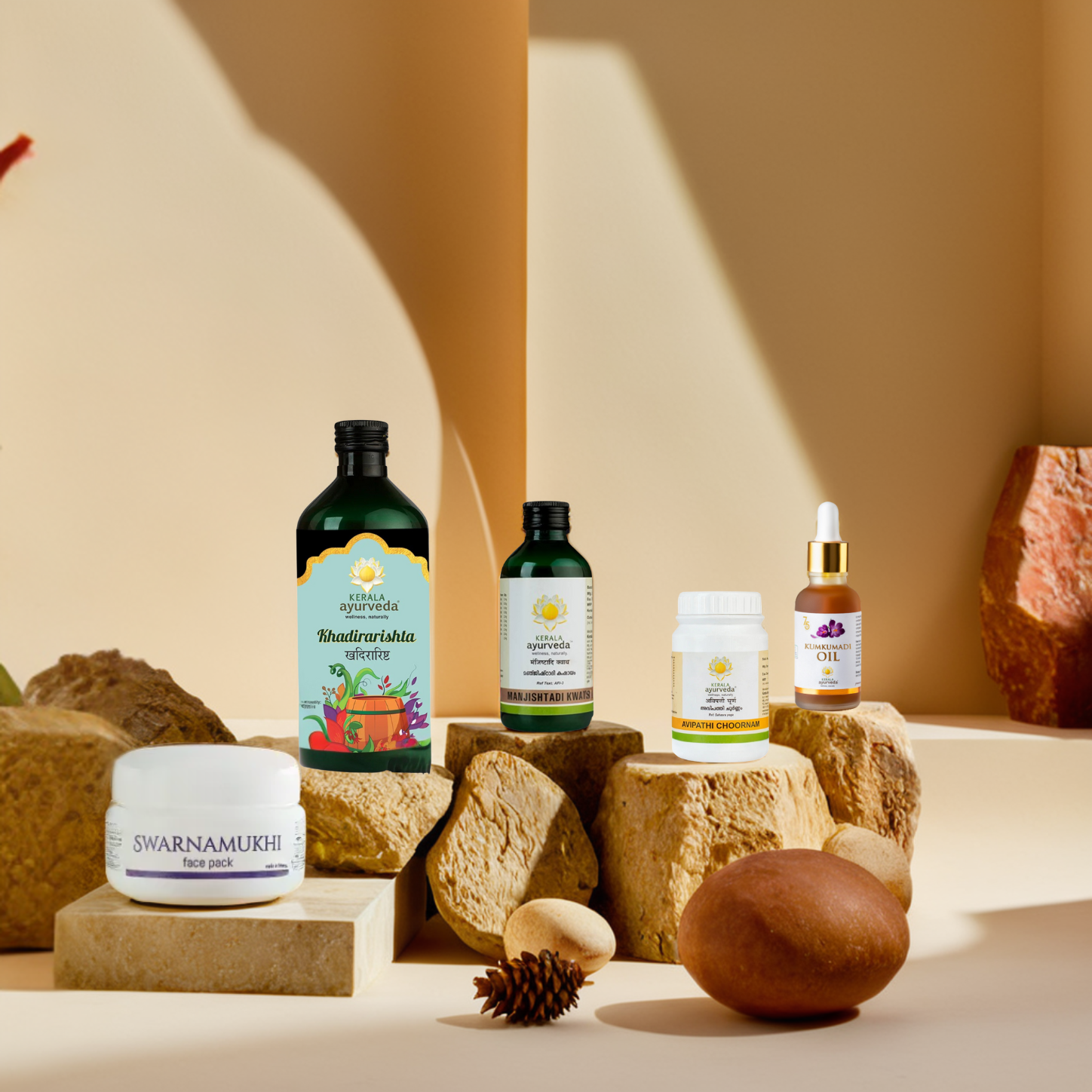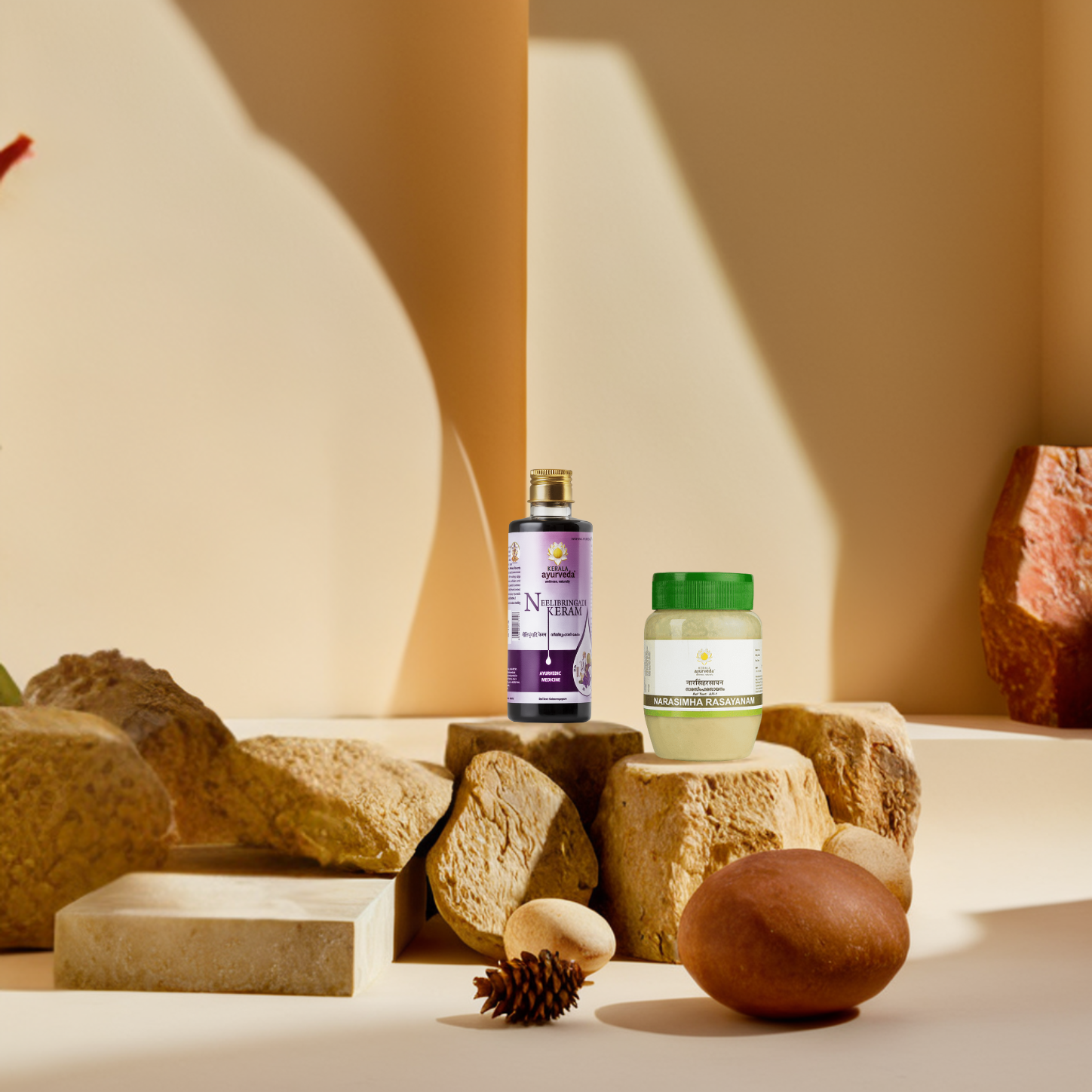Highlights
High cholesterol is a common health concern that may not show symptoms but can adversely affect health in the long run. People dealing with high cholesterol may not even acknowledge it until they go for a health checkup. This delay may aggravate the challenges.
In this post, we discuss Ayurvedic home remedies for controlling cholesterol, along with some proven lifestyle changes that can help manage it. So, buckle up and read on to find out.
Ayurveda and Cholesterol: What’s the Take?
Ayurveda does not view cholesterol through the same lens as western medicine. According to Ayurveda, Medas is a dhatu (tissue) that could be correlated to cholesterol or adipose tissue and may support various circulatory channels (shrotas) inside the body.
These shrotas are of two types: sukshma shrotas (subtle) and sthula shrotas (gross).
While micro shrotas help carry nutrients and waste to and out of the cells, larger shrotas (veins and arteries) carry blood into the heart and out of it. In this process, cholesterol plays a vital role by lubricating the channels.
So, healthy cholesterol isn’t bad for health but is crucial. However, when Ama (toxins) levels in the fat tissue rise, it may cause blockages in the channels.
Apart from that, a more dangerous type of Ama, known as Amavisha, grows when Ama is present in the body for a long time. When Amavisha is not cleansed for a long time, it may start mixing up with the dhatu (body tissues) and mala (wastes). This mix-up may damage the shrotas and may eventually lead to health concerns such as high cholesterol, heart problems, high blood pressure, and stroke.
To manage cholesterol, Ayurveda focuses on a diet to reduce cholesterol. The diet should be such that it can help optimise your body’s fat metabolism. This can be achieved by balancing the Kapha.
Here are a few Kapha balancing food options:
- Astringent foods: Pulses, dry beans, lentils, mung daal.
- Bitter foods: Spinach, kale, chard, garlic, and mustard greens.
Ayurvedic Treatment for Cholesterol: Tips & Home Remedies
Home remedies and Ayurvedic medicine for cholesterol may help maintain normal cholesterol levels. Here are some tips and remedies that can be effective:
Dietary and Lifestyle Changes
As mentioned above, to manage cholesterol, it’s crucial to manage Kapha. A Kapha balancing diet is essential in this case. Plus, a lazy lifestyle may not be healthyfor cholesterol.
Cutting excess calories, quitting smoking, lowering alcohol consumption, and engaging in regular workouts can help eliminate toxins from your body. This can lower the Ama levels in your body. As a result, Amavisha will also go down, allowing cholesterol to efficiently lubricate and support the nutrient transportation and waste elimination processes.
Heat therapy can also help lower the body’s overall LDL (bad cholesterol) levels.
Drink Green Tea
Green tea is a substantial source of polyphenols. These are chemical compounds that help manage blood pressure and keep blood vessels healthy and flexible. This promotes an optimum flow of blood through the body.
By drinking green tea twice a day, you can reap significant benefits, as these polyphenols not only help lower LDL but can also increase the HDL levels in your body.
The elimination of bad cholesterol helps keep your shrotas clean, lubricated, and flexible.
Coriander Seeds
Coriander seeds have long been finding their place in the list of various Ayurvedic remedies. This is because these seeds are rich in folic acid, Vitamin A, and Vitamin C. These nutrients make coriander seeds an excellent remedy for pacing up your body’s detox process.
Speaking of how to use these, you can place one teaspoon of coriander seeds in a glass of water and leave it overnight. In the morning, you can take the seeds out and drink the water sip-by-sip. This can help cleanse your system and remove excess Ama when consumed regularly.
Also, coriander has Kapha pacifying properties that can further help manage cholesterol.
Fenugreek Seeds
Methi seeds, a.k.a fenugreek seeds, have long been used to add flavor to food. But its uses go beyond that. Fenugreek seeds have been used for their medicinal properties since ancient times. These seeds are rich in Vitamin E and have various antidiabetic, antioxidant, and anti-inflammatory properties.
Fenugreek seeds are rich in saponins. These glycosidic compounds help eliminate bad cholesterol from the body, helping improve blood flow.
Half a spoon of fenugreek seeds consumed twice a day can help manage all types of cholesterol concerns.
An Amla a Day
Amla, a.k.a Indian gooseberry, is a fruit found in the Indian subcontinent. One of the best things about Amla is its high Vitamin C and polyphenol content. And, we can guess how it would be perfect for managing the effects of high cholesterol.
Its efficacy and potential can be estimated by a study conducted by the Indian Journal of Pharmacology. According to the study, Amla’s effects for lowering cholesterol can be compared to those of clinically prescribed drugs.
To reap the benefits, it’s advisable to take at least one to two Amla fruits each day. This can be your perfect Ayurvedic remedy for cholesterol.
Foods to Avoid with High Cholesterol
High cholesterol is a health condition that largely depends on the food that you eat or don’t eat. While the foods mentioned in the previous sections can help manage and lower cholesterol, the following foods can aggravate it.
To manage your cholesterol condition, avoid eating these foods:
- Processed or deli-style meat items (for example - ham, bacon, and salami)
- Deep-fried foods.
- Processed food items (such as biscuits and pastries).
- Fast food/junk food items such as pizzas, burgers, etc.
- Fats on meat and chicken skin.
- Ghee, lard and copha.
- Palm oil.
Herbal Supplements to Regulate High Cholesterol
Earlier, according to Ayurveda, cholesterol imbalance is linked to Kapha dosha. Ayurveda suggests that when Kapha levels in the body shift away from optimum and Ama levels in the body rise, toxins mix up with the tissues and attack the shrotas.
However, Ayurvedic medicine also has a list of herbs that are said to have the potential to manage high cholesterol conditions. While it may be challenging to find herbs that lower cholesterol quickly, the following herbs may help manage it:
- Haritaki (terminalia chebula)
- Guggul (Commiphora wightii)
- Amalaki (Emblica Officinalis)
- Silajatu-suddha (Shilajit)
- Bibhitaki (Terminalia bellerica)
- Arjuna
- Triphala
A study conducted on 87 people with high LDL concluded that people taking 5 grams of Arjuna powder twice a day for three weeks, twice a day for four weeks, experienced a notable drop in the overall LDL levels.
Similarly, studies have also reported that Triphala is helpful in relieving constipation and aiding the body’s overall detox process. These properties of Triphala may help it reduce cholesterol.
Additionally, Liposem tablets comprise Guggul and Arjuna that manage cholesterol.
Conclusion
To lead a healthy life, we need to maintain healthy levels of good cholesterol in our bodies. This comes through healthy eating habits and healthy lifestyle choices. This blog discussed cholesterol and Ayurvedic treatments and home remedies to reduce cholesterol.
Key Takeaways
Taking care of your body’s cholesterol levels is essential. In this blog, we discussed multiple pointers for managing cholesterol. Let’s look at what we learned.
- To manage cholesterol levels, it's important to balance Kapha levels.
- Dietary and lifestyle changes, including specific herbs and foods, can help reduce bad cholesterol.
- Deep-fried foods, fast food, fats on meat and chicken skin, ghee, and palm oil are a few foods that should be avoided for managing cholesterol.
- Herbs such as Haritaki, Guggul, Amalaki, Bhibhitaki, etc. can help manage cholesterol.
We answered some of the most frequently asked questions relating to cholesterol. Hopefully, this information helps you maintain good health.




